I made marinara sauces using 4 celebrity chefs' recipes, and the best calls for red wine

- I tried marinara-sauce recipes from celebrity chefs including Alex Guarnaschelli and Tyler Florence.
- Giada De Laurentiis' sauce had a celery aftertaste I didn't like and took the longest to make.
I compared recipes from celebrity chefs Alex Guarnaschelli, Tyler Florence, Giada De Laurentiis, and Ina Garten.
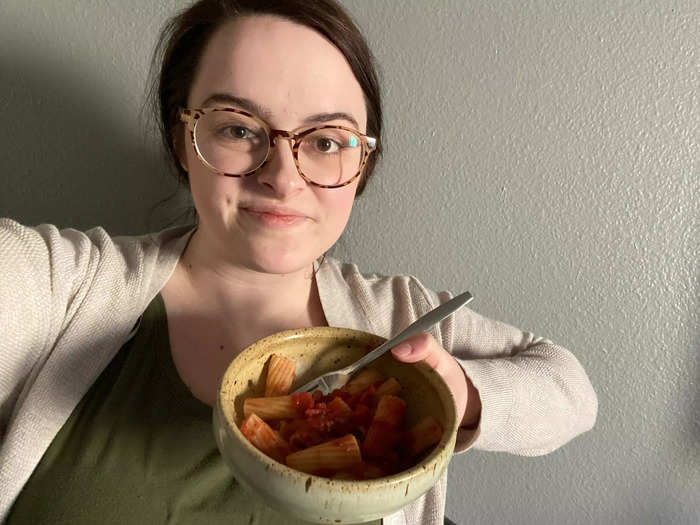
I love a bowl of basic noodles with a classic marinara sauce, especially the homemade version.
Homemade marinara is easy enough to make on a busy weeknight and uses ingredients already in my pantry like tomatoes, onions, garlic, olive oil, and herbs and spices.
I tested four recipes from celebrity chefs Guarnaschelli, Florence, De Laurentiis, and Garten in hopes of finding a solid, go-to marinara recipe that also tastes delicious.
Click to check out the other celebrity-chef recipes we've put head-to-head so far.
Guarnaschelli's sauce uses grated carrots for a touch of sweetness.
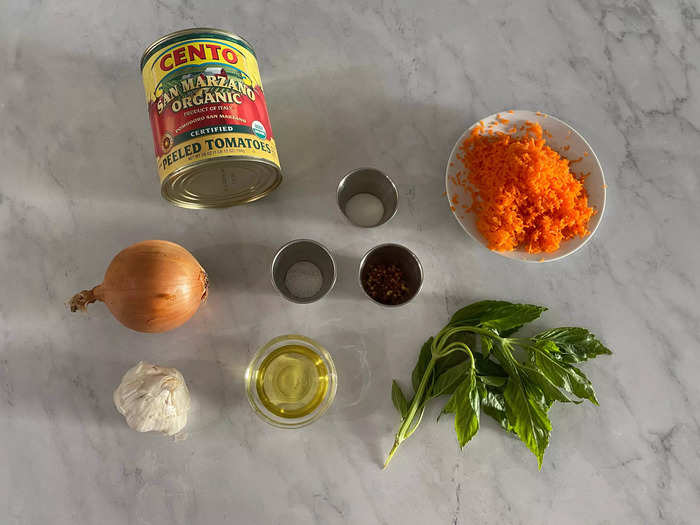
Guarnaschelli uses a recipe from her late mother, cookbook editor Maria Guarnaschelli.
The ingredients are simple and include whole, peeled canned tomatoes, grated carrots, sugar, onion, garlic, and some spices to bring more flavor.
I added a lot of vegetables to this sauce.
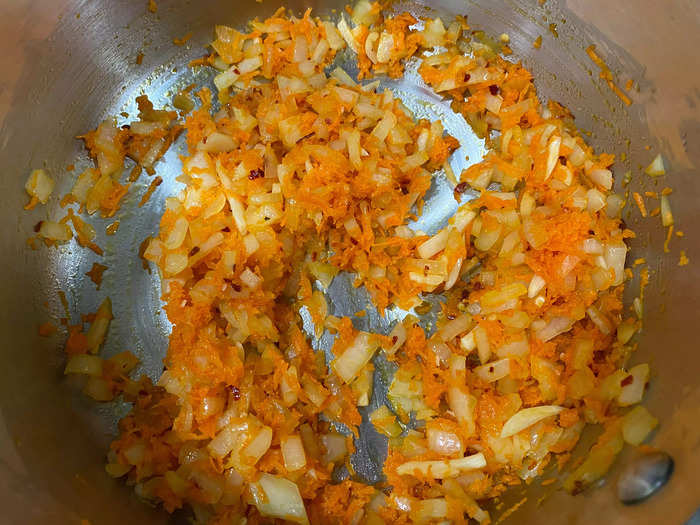
I began by chopping my onion, cutting the garlic into thin slices, and grating some carrots.
I sautéed the onion, garlic, sugar, salt, and red pepper flakes until the former was translucent and then added the grated carrots. By this point, the caramelized onions and carrots smelled amazing.
The prep was minimal and most of the recipe just required watching and stirring.
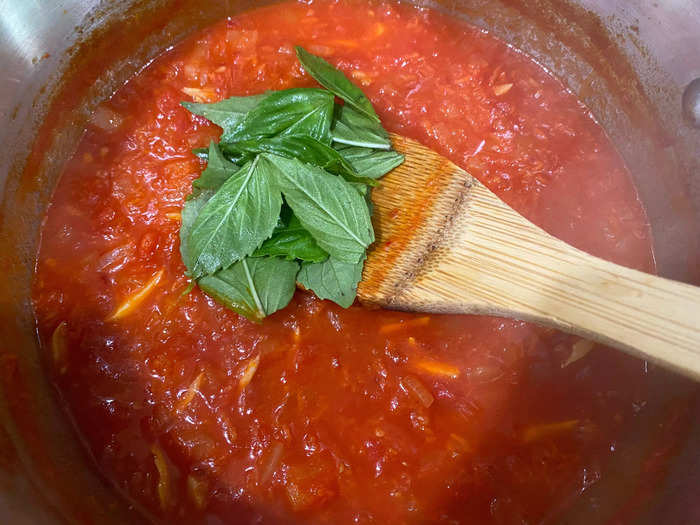
I was worried adding the whole, peeled tomatoes would create a weird texture (the other recipes used crushed tomatoes) but they broke down nicely as the sauce simmered.
From there, it was mostly a game of watching the pot, stirring occasionally throughout 45 minutes, and pouring in a little water when the sauce started to look dry. I added about 3/4-cup of water throughout this process.
I finished the sauce with a handful of fresh basil and it was ready to pour over some noodles.
Guarnaschelli's marinara had a nice balance of flavors.
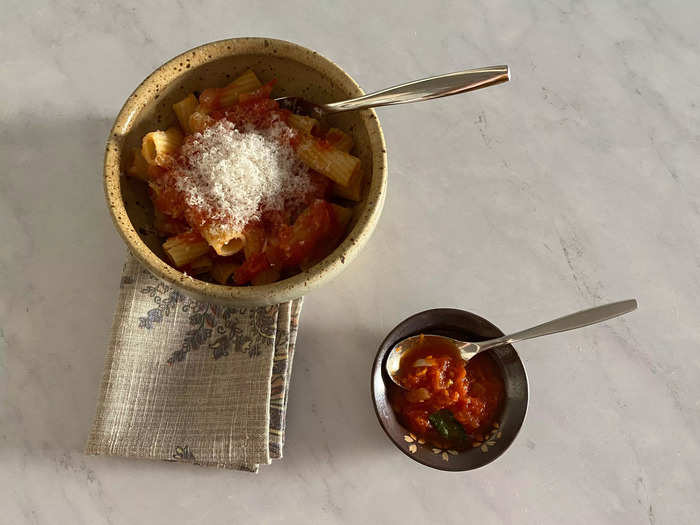
Guarnaschelli's recipe also called for some freshly grated Parmesan, which I couldn't say no to.
The flavor was well-balanced, with a kick from the red-pepper flakes, sweetness from the carrots and sugar, and savoriness from the onions and garlic. The basil also tasted fresh, and it all worked well with the sprinkling of salty Parmesan.
This marinara is definitely worth making again but next time, I'd mince the garlic instead of thinly slicing it since I didn't love that texture.
For a simple marinara, Florence uses pantry staples.
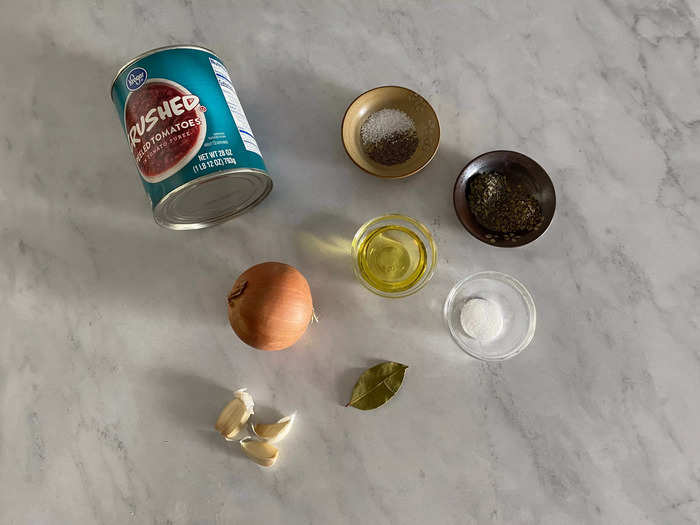
Florence's marinara-sauce recipe takes only about 30 minutes to make and relies on dried herbs for flavor.
His recipe called for canned crushed tomatoes, onion, garlic, sugar, salt and pepper to taste, and dried basil, oregano, and a bay leaf.
Florence's recipe is great for busy weeknights.
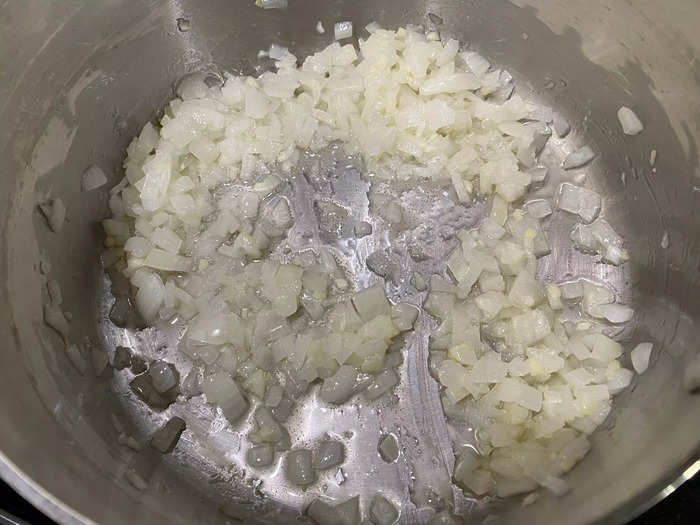
I started by sautéing the chopped onion and minced garlic in oil for about five minutes and then added the remaining ingredients.
The sauce was done pretty quickly.
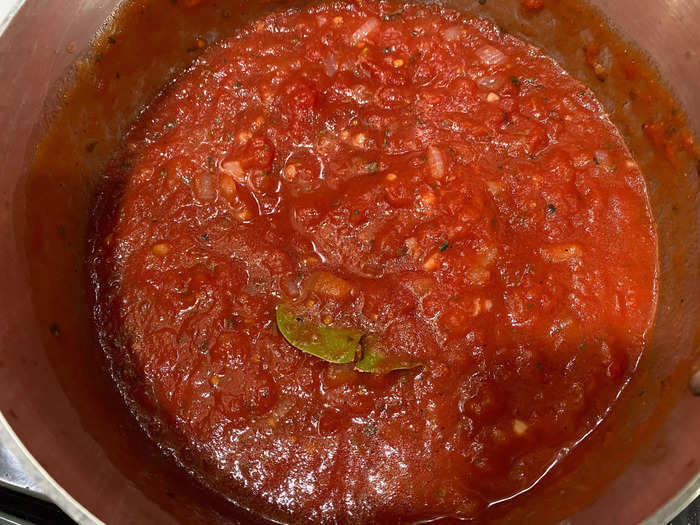
While the tomatoes and spices simmered together, I cooked some noodles. In about 35 minutes, I had homemade marinara and pasta ready to go.
The flavor was good, but I'd prefer fresh over dried herbs.
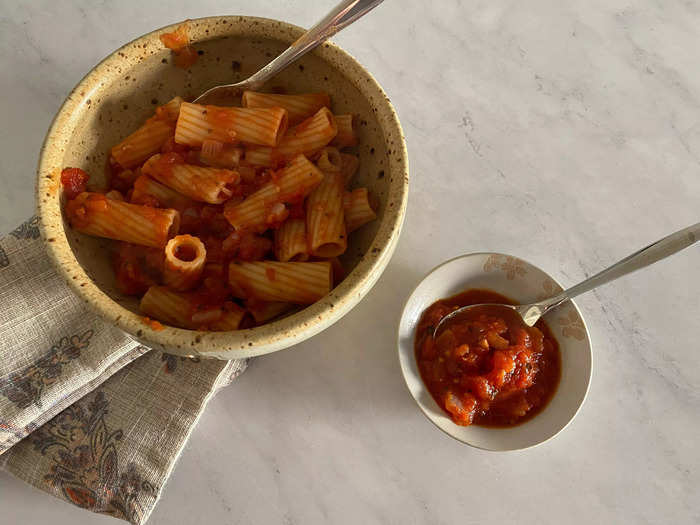
This marinara was chunkier thanks to the tomato and onion.
I liked the slightly sweet and herby flavors but if I made this again, I'd follow Guarnaschelli's lead and stir in some fresh basil at the end. Though it would increase the cooking time, I would also sauté the onions a little bit longer than five minutes since they were chewier than I wanted.
Still, this marinara is a great option for an impressive weeknight dinner.
De Laurentiis relies on several fresh ingredients for her marinara.
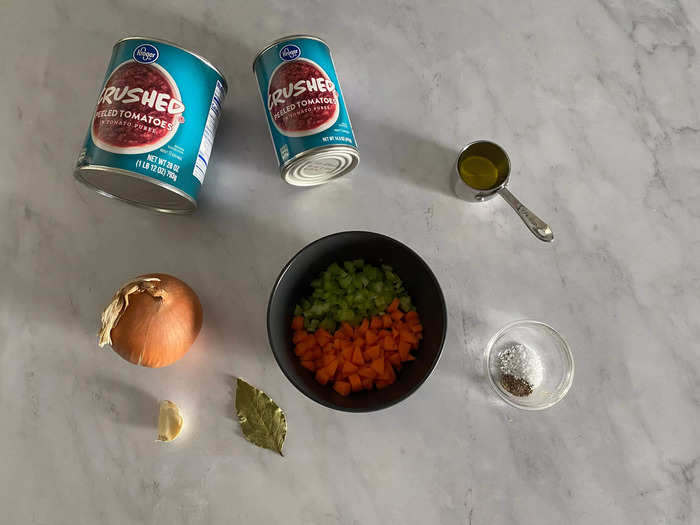
I was intrigued by De Laurentiis' marinara sauce, which incorporates fresh ingredients like onion, garlic, carrot, and celery. Though I'm not a big fan of celery, I figured it would be delicious when sautéed with the other aromatics.
The recipe also required crushed tomatoes, extra-virgin olive oil, salt, black pepper, and a dried bay leaf.
My grocery store didn't carry any 32-ounce portions of crushed tomatoes, so I picked up a 28-ounce can and used 4 ounces from a 14.5-ounce one.
I made sure to cook all the vegetables until they were soft.
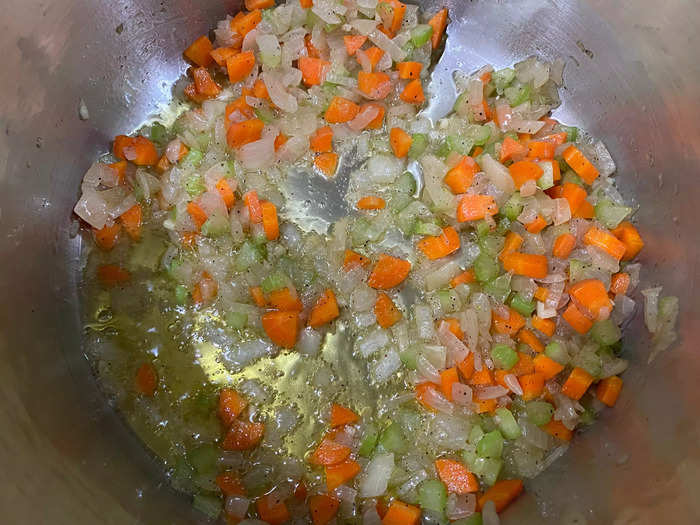
Although it was an easy, mostly hands-off recipe, this marinara took the longest to make.
I started by finely chopping all of the fresh ingredients and then sautéed the onions and garlic together. I added the carrots, celery, salt, and pepper, cooking until all the vegetables had softened.
De Laurentiis' recipe required the longest cooking time.
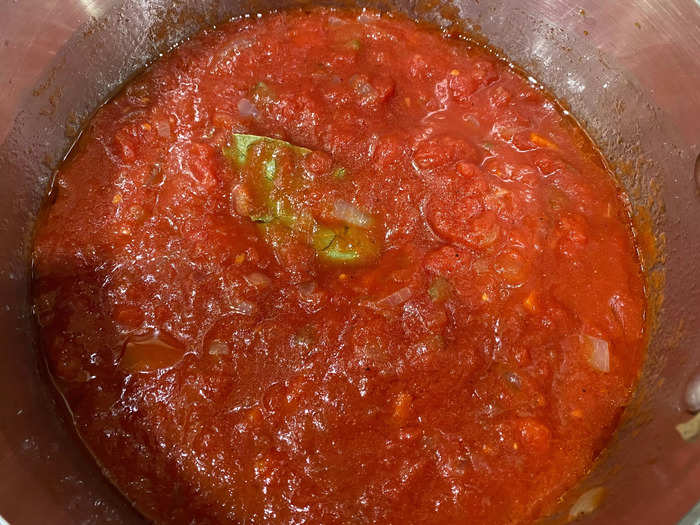
After a 20-minute sautéeing process, I added the canned tomatoes and bay leaf.
Once everything was stirred, I let the marinara simmer for an hour to meld the flavors.
The celery flavor overpowered this marinara.
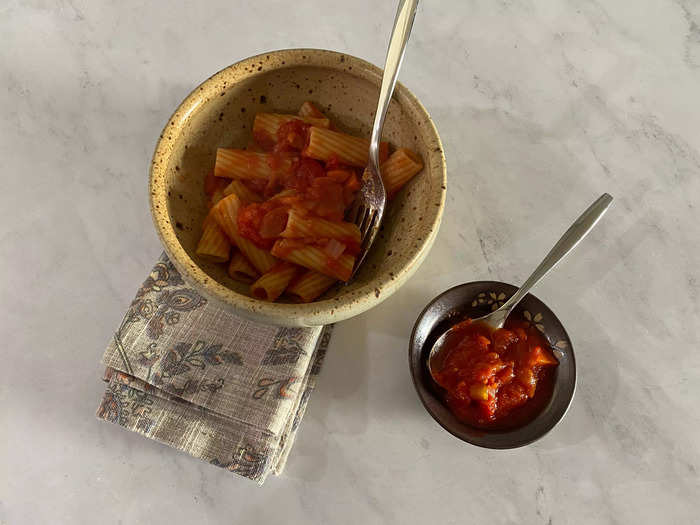
This marinara was very chunky from the diced carrots and celery.
At first, I loved the sweet flavor of the sauce but there was a strong celery aftertaste. I used only one celery stalk in the entire batch of marinara so I was disappointed that I tasted this ingredient more than anything else.
Because of the time required for this marinara and the end result, I probably wouldn't make it again. If I did, I'd grate the carrots for a better texture and omit the celery completely.
Garten uses a hefty amount of wine in her marinara.
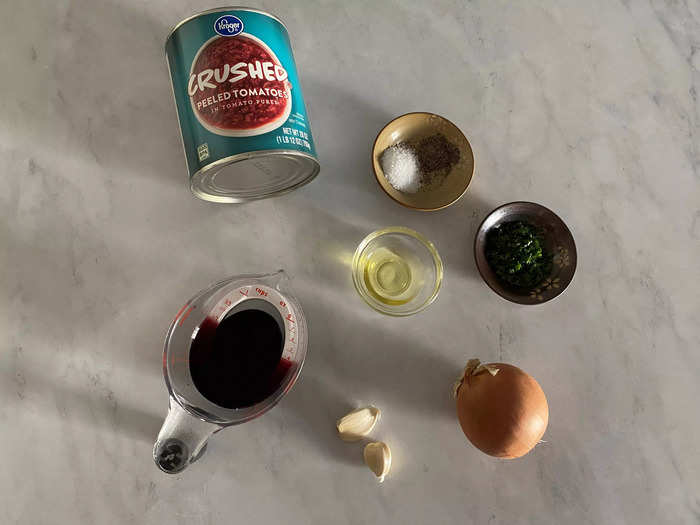
I was intrigued by Garten's use of red wine in her marinara-sauce recipe. I know wine is great for deglazing pots and pans, but I hadn't used it in marinara before.
Garten's marinara uses a 1/2-cup of wine, crushed tomatoes, fresh parsley, salt, and pepper, and like the other recipes, onion, garlic, and olive oil.
Adding the wine was one of the first steps.
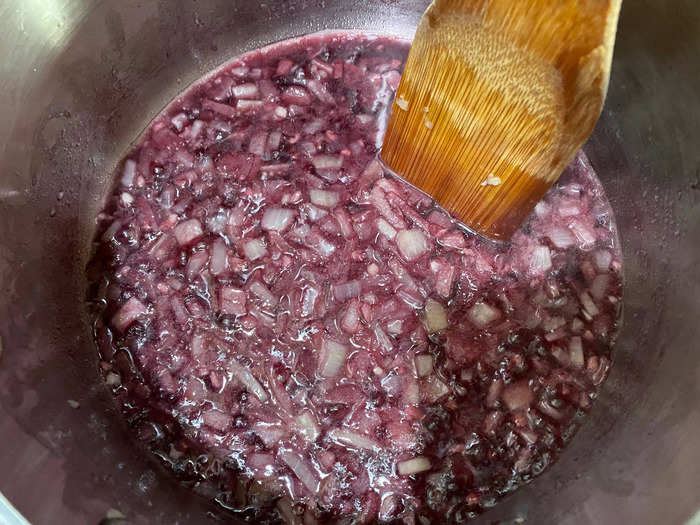
I started by sautéing the onions and garlic for about 10 minutes and then added the red wine to deglaze. The wine evaporated pretty quickly as I stirred the mixture.
This was the fastest of the four recipes.
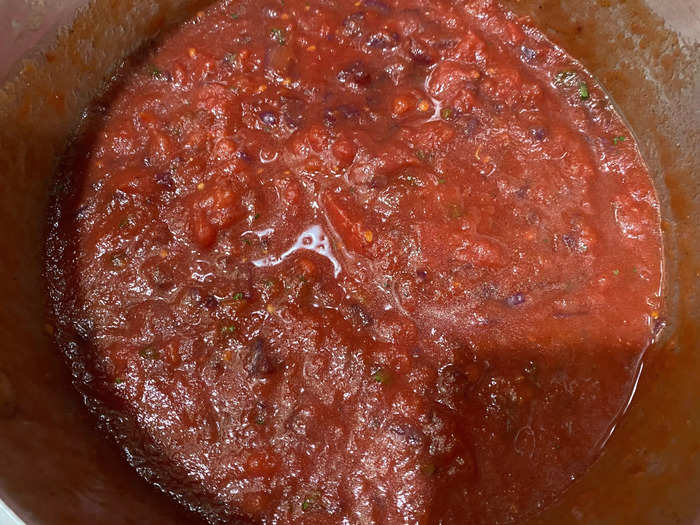
Once the wine had boiled down, I added the tomatoes, parsley, salt, and pepper, which I let simmer for about 15 minutes.
The wine and parsley made this marinara sauce really stand out.
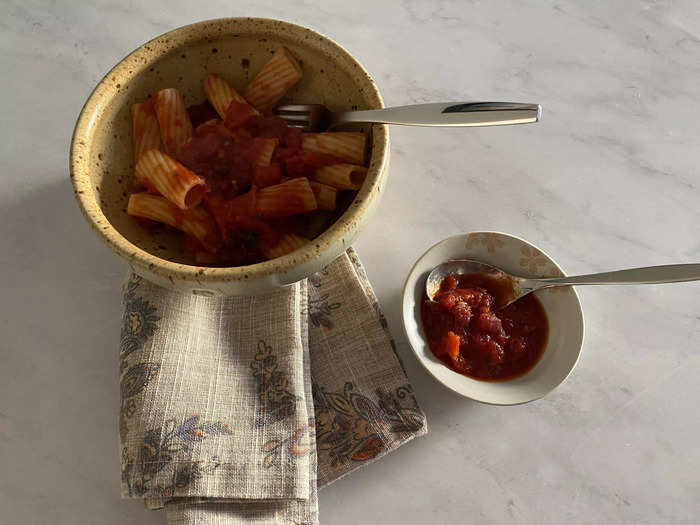
I loved the flavor of this sauce because it had the right amount of sweetness from the wine and tomatoes as well as richness and depth from the beverage. The parsley helped brighten the sauce and balance out the richness.
For how quickly this recipe came together, I was truly impressed by how delicious it was. Plus, it gave me an excuse to open a bottle of wine.
Garten's marinara recipe was my favorite sauce.
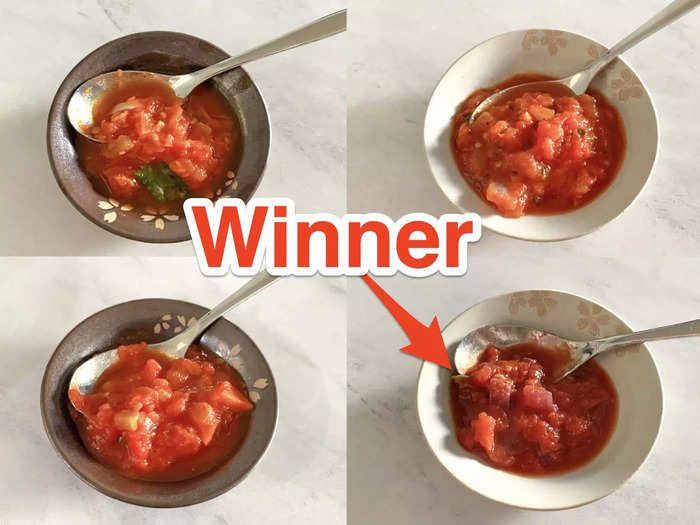
Of the four recipes, Garten's was my favorite. In addition to being delicious and flavorful, it was very quick to make. I didn't have any notes on ways to improve it, and I will definitely make it again.
Guarnaschelli's sauce is also a close second because I loved that it calls for grated carrots, not diced ones. They added an earthy sweetness and great texture to the sauce. It was also a pretty easy recipe and was ready in less than an hour.
The next time I plan on making pasta, I'll turn to these two marinara-sauce recipes.
Popular Right Now
Advertisement